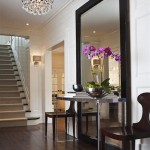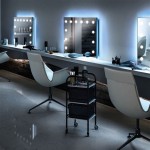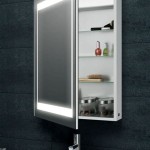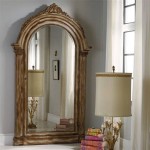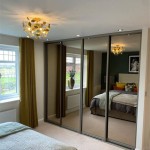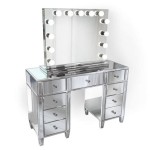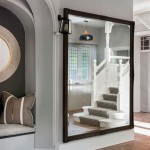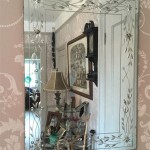How Much Does a Mirror Cost?
The cost of a mirror can vary significantly depending on several factors. Understanding these factors can help consumers make informed decisions and budget appropriately when purchasing a mirror for their homes or businesses.
Factors Influencing Mirror Costs
* **Size:** Larger mirrors generally cost more due to increased material and manufacturing costs. A small vanity mirror will naturally be less expensive than a large, floor-length mirror or a custom-sized wall mirror. * **Material:** The type of glass used impacts the price. Standard glass is the most affordable, while higher-quality, thicker glass designed for specific purposes, such as for gyms or dance studios, can increase the cost. * **Frame:** A simple, unframed mirror will be less expensive than one with an ornate or custom frame. Frame materials, such as wood, metal, or plastic, and their level of craftsmanship, significantly influence the overall price. * **Shape:** Standard rectangular or square mirrors are typically less expensive to produce than custom shapes, such as circles, ovals, or other irregular designs. * **Features:** Additional features, such as built-in lighting, anti-fog coatings, or beveling, add to the overall cost. Smart mirrors with integrated technology are significantly more expensive than traditional mirrors. * **Brand and Retailer:** Prices can vary between different brands and retailers. Luxury brands or high-end retailers often command higher prices. * **Installation:** Professional installation adds to the total cost, especially for large or complex installations.
Estimating Costs by Mirror Type
* **Small Vanity Mirrors:** These typically range from $10 to $50, depending on the frame and features. Simple, frameless options are at the lower end of this range, while decorative or lighted vanity mirrors increase the cost. * **Bathroom Mirrors:** Standard bathroom mirrors can cost between $50 and $300. Larger mirrors, framed options, or those with additional features like medicine cabinets or lighting will be more expensive. * **Full-Length Mirrors:** Prices typically range from $100 to $500. Large, framed, or freestanding full-length mirrors are at the higher end of this spectrum. Simple, frameless, or leaning mirrors tend to be more affordable. * **Wall Mirrors:** Decorative wall mirrors vary significantly in price, ranging from $50 to several hundred dollars, depending on size, frame, and design. Large, ornate mirrors or those made with specialty materials are likely to be more expensive. * **Custom-Cut Mirrors:** The cost of custom-cut mirrors is determined by the size, shape, and complexity of the design. These can range from a few hundred dollars to thousands of dollars for large or intricate projects.
Budgeting Tips for Mirror Purchases
* **Prioritize Needs:** Determine the essential functions of the mirror. Is it primarily for practical use or aesthetic enhancement? This will help guide the selection process and budget allocation. * **Compare Prices:** Research prices from various retailers and compare options based on size, features, and quality. Online marketplaces and local stores can provide a range of choices. * **Consider DIY Framing:** Purchasing a simple, frameless mirror and framing it yourself can be a cost-effective way to achieve a custom look without the high price tag of a pre-framed mirror. * **Look for Sales and Discounts:** Retailers frequently offer sales and discounts on mirrors, particularly during holiday seasons or clearance events. Taking advantage of these promotions can lead to significant savings. * **Factor in Installation Costs:** If professional installation is required, obtain quotes from multiple installers to ensure competitive pricing.
Exploring Different Mirror Materials
* **Standard Glass:** The most common and affordable option, suitable for most applications. * **Tempered Glass:** More durable and shatter-resistant than standard glass, often used in high-traffic areas or for safety reasons. It carries a higher price tag than standard glass. * **Acrylic Mirrors:** Lighter and less prone to breakage than glass, making them a good choice for children's rooms or other areas where safety is a concern. Acrylic is generally less expensive than glass. * **Specialty Glass (e.g., Low-Iron Glass):** Offers superior clarity and color accuracy, often used in high-end applications. This is a more expensive option.
Framing Options and Their Impact on Cost
* **No Frame:** The most budget-friendly option, providing a clean, minimalist look. * **Metal Frames:** Offer a contemporary or industrial aesthetic, with prices varying depending on the type of metal and finish. * **Wood Frames:** Provide a classic or rustic look, with prices influenced by the type of wood and intricacy of the design. * **Plastic Frames:** A more affordable option, often used for lightweight mirrors or in less formal settings. * **Custom Frames:** Allow for personalized designs and materials, but typically come at a higher cost.
Installation Considerations
* **DIY Installation:** Suitable for smaller, lighter mirrors. Requires basic tools and some DIY experience. * **Professional Installation:** Recommended for larger, heavier mirrors, or complex installations. Involves additional costs for labor and materials. * **Wall Preparation:** Ensure the wall is properly prepared before installation to avoid issues with stability and safety.

Fixr Com Bathroom Mirror Installation Cost Costs

Fixr Com Bathroom Mirror Installation Cost Costs

How Much Does A Custom Cut Mirror Cost Angi
What The 1 500 Mirror For Workout Classes Is Like To Use Review
What The 1 500 Mirror For Workout Classes Is Like To Use Review

How Much Does It Cost To Replace A Side Mirror T S Auto Glass

How Much Does Side Mirror Replacement Cost Way Blog

How Much Does It Cost To Replace A Side View Mirror In 2024 Revemoto

The Cost Of Mirror Glass Learn Blowing

How Much Do Custom Glass Mirrors Windows Cost Merrimack Valley Mirror

